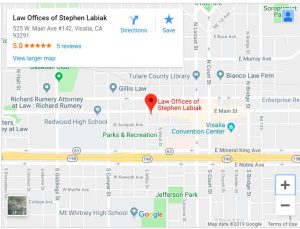Despite the common knowledge to the contrary, it is possible to reduce or eliminate your student loan debt in a Chapter 7 or Chapter 13 Bankruptcy in Fresno.
First off, to discharge these debts, you must file an adversarial proceeding. For most debts, such as credit cards or doctor bills, when you receive your discharge, your liability for the debt is eliminated. With student loans, you must file an adversarial proceeding in Bankruptcy Court. This is a mini-trial involving only your student loans. To determine whether the student loan debt will be discharged in your Ch 7 or Ch 13 Bk proceeding, there is a three part test called the Brunner test. This is the test used for the Eastern District of California, and others as well. Other jurisdictions may follow this or another legal test. The Brunner test requires the debtor to pass all three of the following elements:
(1) he/she cannot maintain, based on current income and expenses, a “minimal” standard of living for the debtor and his/her dependents if required to repay the loans;
(2) additional circumstances exist indicating that this state of affairs is likely to persist for a significant portion of the repayment period; and
(3) the debtor has made good faith efforts to repay the loans.
- Cannot maintain a minimal standard of living based on income if required to repay.
The standard of living will take a look at your budget and determine if you have money left over to pay the student loans. This is a more stringent standard than the test used to determine if a person qualifies for a Chapter 7 or a Chapter 13 Bankruptcy.
This is not any easy test to pass, but it is possible. Expenses need to be at a minimum (so no $300 cell phone bill), and still no money left over to pay back the student loans. Also unlike the standard test to qualify for a Chapter 7 Bankruptcy, the court may decide you have to pay back only part of your student loans. For a Chapter 7 Bankruptcy, you either quality or you do not; all or nothing. For a student loan discharge proceeding it can be between 0 to 100% repayment. The court will look at your entire situation in making this determination.
- State of affairs is likely to persist.
This means that you are broke now, and are going to be broke in the future. For example, if you are on permanent disability, your financial situation is not going to change so your income now is your income in the future. If you are a medical student in your last year of residency, odds are very soon you will be able to repay your loans. A person cannot also be intentionally taking a lousy job to qualify. If you are working 20 hours a week just because work is hard, then you will fail this test. The court will look at each situation individually to determine a person is maximizing their earning potential.
- Good faith effort to repay the loans.
This means the debtor must have made an attempt to repay the loans. If the debtor received an inheritance, was some/all of this used to reduce the debt owed. Did the debtor try to rework the loans? Did the debtor avail himself to government programs to make the debt more affordable? Once again, this will be situation specific and the burden will be on the debtor to show that he tried to repay the loan, even while broke.
So while not impossible, you can discharge your student loan debts in a bankruptcy. You will need to be able to pass the three tests listed out above. To see if you may qualify, contact your bankruptcy professional.


